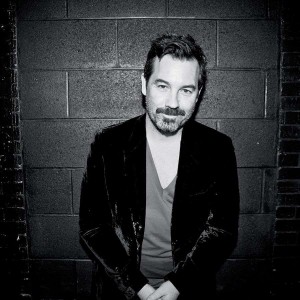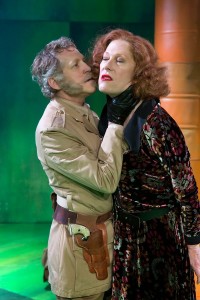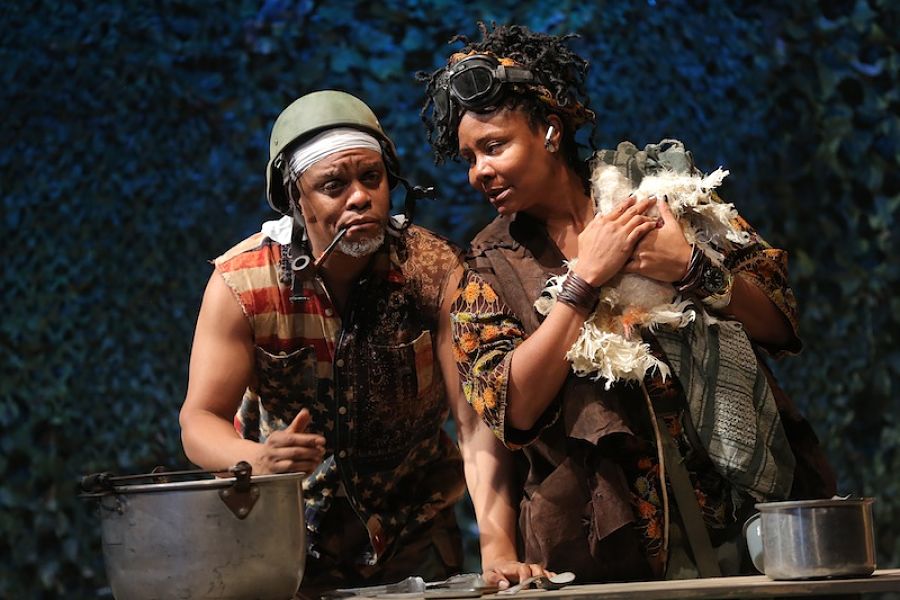“It’s a play about war and conflict, and we had war and conflict inside the company, apparently,” said Duncan Sheik, the songwriter/composer who won a Tony for Spring Awakening and who contributed an original score to Classic Stage Company’s new production of Mother Courage and Her Children. The production originally starred Tonya Pinkins (another Tony winner, for Jelly’s Last Jam) in the title role, but Pinkins announced on Dec. 30 that she would leave the production after reaching an impasse with director Brian Kulick over cuts in the text, differences over the interpretation of her role, and Kulick’s resetting of the play’s historical action in the contemporary Democratic Republic of the Congo. Kecia Lewis was just announced as her replacement.

Sheik, who previously wrote scores for Kulick’s stagings of Brecht’s A Man’s a Man and The Caucasian Chalk Circle, said he was mostly “spared from the brutality of what happened” because he was away during rehearsals. He had sent Kulick prerecorded tracks for all the music and only arrived just before previews began in December. By then, he said, “I knew it was wonky…It seemed to just be a company that maybe was feeling like the leading actor wasn’t being as collaborative as she should be. But I love Tonya, and I don’t want to make any judgments about her at all.”
In a long statement she released about her decision to leave the show—in which she performed as contracted through Sunday, Jan. 3—Pinkins wrote that “Mother Courage was not the star of this production…My Mother Courage is too big for CSC’s definition. So it is best that they find someone to ‘fit in,’ because I cannot.”
I spoke to Sheik by phone on Sunday after Pinkins’s final preview.
ROB WEINERT-KENDT: I saw the show today. Since it wasn’t a press preview, I can’t really say what I thought of it. I can report that there was a rather emotional standing ovation at the end, but also that there was definitely a weird vibe in the room, as you might imagine.
DUNCAN SHEIK: I can totally imagine. I’m thrilled that it had a standing ovation and I’m thrilled that Tonya even took this on in the first place. It’s sort of a little bit of a minor tragedy in a way that it turned out this way. But I was sort of spared from the brutality of what happened because I was away. I was traveling and in between projects, and I had sent Brian Kulick music. So I didn’t appear in New York until things started to kind of get wonky. And I knew it was wonky, that’s for sure. Initially, it seemed to just be a company that maybe was feeling like the leading actor wasn’t being as collaborative as she should be. But I love Tonya and I don’t want to make any judgments about her at all. It’s the theatre, so there’s a little bit of drama.
One of the controversies was over the setting of the piece in the Democratic Republic of the Congo. Can you talk about how that setting influenced your score?
Yeah. I have been through the wringer with [a similar] situation with The Nightingale in La Jolla, where we had a South American but essentially white Jewish director and a Jewish writer and myself, a very lapsed Catholic Buddhist white guy, doing the score. It was cast kind of multiculturally, and the Asian-American community got very, very, very upset about the casting. For me that was literally traumatic, because I personally always wanted to cast it as an Asian show.
So I’ve kind of been through this process before. Brian Kulick had this conception of doing Mother Courage in the Congo, and he cast essentially an all African-American cast to do it this way. Also, I’m working with Lynn Nottage [on The Secret Life of Bees], and she had done Ruined, which is kind of like Mother Courage in Africa. So there’s a precedent for this concept.
But I was not in the room enough to know what the issues really were, and if there was anyone to blame. It’s Brecht, and if you take on Brecht, if you take on Mother Courage, you have to expect a certain amount of intense inter-company interaction. You’re not doing an evening’s light entertainment. It’s a play about war and conflict, and we had war and conflict inside the company, apparently. And for me, again, mercifully, I was sort of separated from it in some ways.
Regarding the music, I talked to Kevin Mambo, who is also in the show and is doing a wonderful, amazing job, and I spoke to Tonya and to lots of people about, well, are there people that I should work with, like musicians who are well-versed in this kind of territory? But logistically, CSC is a small theatre downtown; they don’t really have huge budgets. So I ended up making all the music myself. And I’m very, very proud of the score, but of course, I’m a white guy making music that’s sort of like Brecht in the Congo. So yeah, that’s a super-weird thing. I mean, I understand why it’s hard on some people. I do understand.
Oddly enough, your music hasn’t come up in the back and forth about the show. I will say I liked your version of “The Song of Fraternization” and your “Solomon Song.” That last one is hard, because there are so many great versions of it already.

Well, I’ve done two of these before with CSC, so this is kind of like me finishing the trilogy, so to speak. This one got pushed up in the schedule, which put me in a tricky position, because I had to deliver material more quickly than I wanted to. But that was okay. Brian seemed to be happy and Tonya seemed to be happy, but then I think in rehearsals and in previews, obviously there were issues.
All I can say is, for me, it’s a huge honor—Brian gave me this incredible opportunity to work on three different Brecht shows, and this one was, to me, by far the most exciting and intriguing. And the most fun to work on. It was incredibly enjoyable, an incredibly great experience. It’s one of the ironies of life that sometimes the most enjoyable things turn into—they can become a little bit of a shambles.
I think I can safely say the show I saw today wasn’t a shambles. But I do look forward to going back to see whoever it is in it next…
When our new Mother Courage comes in. It’s an incredible company, so hopefully it will continue to run the best way it can. What more can I say?


